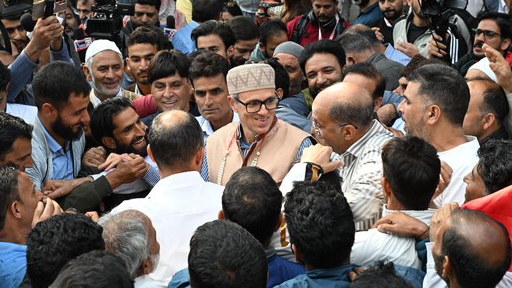
SRINAGAR (TIP): Paving the way for National Conference (NC) vice-president Omar Abdullah to take charge as the Chief Minister of Jammu and Kashmir, his party’s legislators on Thursday, October 10, unanimously approved his name for the top post. NC president Farooq Abdullah announced that his son had been unanimously chosen as the chairman of the legislature party. This clears the way for the younger Abdullah to stake his claim, with the Congress’s support, to form the government in J&K after a gap of 10 years. The new government’s formation is likely to be finalized in the next two days. “Talks are ongoing with the Congress party. Once the Congress provides its letter of support, the NC will approach the Raj Bhavan to formally stake its claim to form the government,” Mr. Abdullah said. Representatives of the Congress, which managed to win only six of the 32 seats it contested, are likely to meet NC leaders in Srinagar on Friday, October 11. Party sources said the two parties were discussing the modalities and composition of the government “for a smooth transition”. The NC received a shot in the arm as four Independent legislators, all from the Jammu region, announced their support: Pyare Lal Sharma (Inderwal), Satish Sharma (Chhamb), Choudhary Mohammed Akram (Surankote), and Rameshwar Singh (Bani). These four will add to the NC’s own tally of 42 seats in the 90-member Assembly. The new government will also have the support of the Communist Party of India (Marxist)’s lone MLA Mohamad Yousaf Tarigami and the six Congress legislators.
Top NC leaders have been promising to include leaders from Jammu in the government to ensure representation from the region. The BJP swept most of the seats in the plains of Jammu, in the Samba, Kathua, and Reasi districts, winning 29 seats. In the Valley, the INDIA bloc was chosen decisively over rivals who included independents fielded by the banned Jamaat-e-Islami. A CSDS-Lokniti survey report showed that in Jammu and Kashmir, it was a vote for strengthening the democratic process, but that while statehood seems to be the main ground of convergence, party choices sharply bring to the fore the divergences between the Jammu region and Kashmir Valley.
The Hindu, in an editorial pointed out that the Chief Minister-designate’s work is cut out as he embarks upon the tough path of fulfilling promises made to the electorate in the Union Territory. “The NC must now live up to this mandate but the task is not easy.” But it pointed out that with the electorate ensuring that the INDIA bloc got the reins to power, it would be best if the Centre respected the mandate, accelerated the process of restoring statehood and allowed the newly elected government to fulfil its promises.
(With input from The Hindu)


Be the first to comment